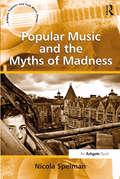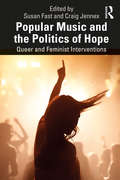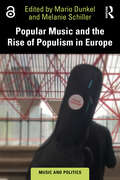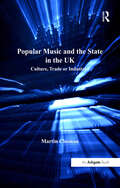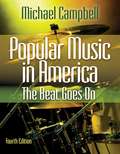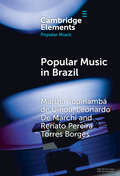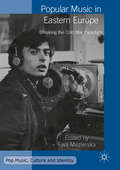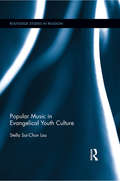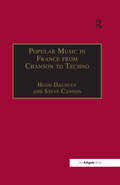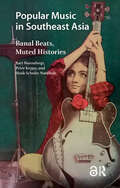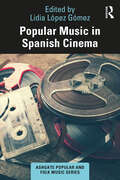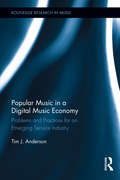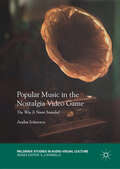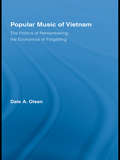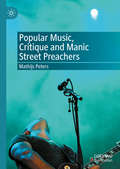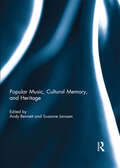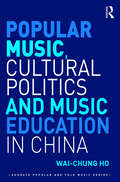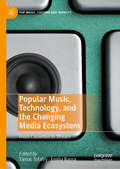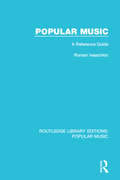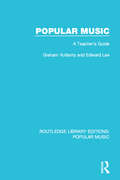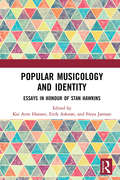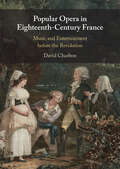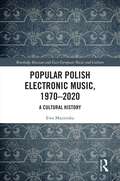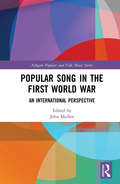- Table View
- List View
Popular Music and the Myths of Madness (Ashgate Popular and Folk Music Series)
by Nicola SpelmanStudies of opera, film, television, and literature have demonstrated how constructions of madness may be referenced in order to stigmatise but also liberate protagonists in ways that reinforce or challenge contemporaneous notions of normality. But to date very little research has been conducted on how madness is represented in popular music. In an effort to redress this imbalance, Nicola Spelman identifies links between the anti-psychiatry movement and representations of madness in popular music of the 1960s and 1970s, analysing the various ways in which ideas critical of institutional psychiatry are embodied both verbally and musically in specific songs by David Bowie, Lou Reed, Pink Floyd, Alice Cooper, The Beatles, and Elton John. She concentrates on meanings that may be made at the point of reception as a consequence of ideas about madness that were circulating at the time. These ideas are then linked to contemporary conventions of musical expression in order to illustrate certain interpretative possibilities. Supporting evidence comes from popular musicological analysis - incorporating discourse analysis and social semiotics - and investigation of socio-historical context. The uniqueness of the period in question is demonstrated by means of a more generalised overview of songs drawn from a variety of styles and eras that engage with the topic of madness in diverse and often conflicting ways. The conclusions drawn reveal the extent to which anti-psychiatric ideas filtered through into popular culture, offering insights into popular music's ability to question general suppositions about madness alongside its potential to bring issues of men's madness into the public arena as an often neglected topic for discussion.
Popular Music and the Politics of Hope: Queer and Feminist Interventions
by Susan Fast Craig JennexIn today’s culture, popular music is a vital site where ideas about gender and sexuality are imagined and disseminated. Popular Music and the Politics of Hope: Queer and Feminist Interventions explores what that means with a wide-ranging collection of chapters that consider the many ways in which contemporary pop music performances of gender and sexuality are politically engaged and even radical. With analyses rooted in feminist and queer thought, contributors explore music from different genres and locations, including Beyoncé’s Lemonade, A Tribe Called Red’s We Are the Halluci Nation, and celebrations of Vera Lynn’s 100th Birthday. At a bleak moment in global politics, this collection focuses on the concept of critical hope: the chapters consider making and consuming popular music as activities that encourage individuals to imagine and work toward a better, more just world. Addressing race, class, aging, disability, and colonialism along with gender and sexuality, the authors articulate the diverse ways popular music can contribute to the collective political projects of queerness and feminism. With voices from senior and emerging scholars, this volume offers a snapshot of today’s queer and feminist scholarship on popular music that is an essential read for students and scholars of music and cultural studies.
Popular Music and the Rise of Populism in Europe (Music and Politics)
by Melanie Schiller Mario DunkelThis book focuses on the role of popular music in the rise of populism in Europe, centring on the music-related processes of sociocultural normalisation and the increasing prevalence of populist discourses in contemporary society. In its innovative combination of approaches drawing from (ethno)musicology, sociology, and political science, as well as media and cultural studies, this book develops a culture-oriented approach to populism. Based on shared research questions, an original theoretical framework and a combination of innovative methodologies that pay attention to the specific socio-historical contexts, taking into account musical material as well as processes of reception, the five chapters in this volume offer detailed analyses of the nexus of popular music and populism in Hungary, Italy, Austria, Sweden and Germany. All of these countries have seen a marked increase in populist parties and discourses over the last years, as well as significant interactions between populism and popular music. This book will be essential reading for those investigating popular music as a crucial aspect in the study of populism as a cultural phenomenon in Europe.The Open Access version of this book, available at http://www.taylorfrancis.com, has been made available under a Creative Commons [Attribution-Non Commercial-No Derivatives (CC-BY-NC-ND)] 4.0 license.
Popular Music and the State in the UK: Culture, Trade or Industry? (Ashgate Popular and Folk Music Series)
by Martin CloonanIn an era of the rise of the free market and economic globalization, Martin Cloonan examines why politicians and policymakers in the UK have sought to intervene in popular music - a field that has often been held up as the epitome of the free market form. Cloonan traces the development of government attitudes and policies towards popular music from the 1950s to the present, discovering the prominence of two overlapping concerns: public order and the political economy of music. Since the music industry began to lobby politicians, particularly on the issue of copyright in relation to the internet, an inherent tension has become apparent with economic rationale on one side, and Romantic notions of 'the artist' on the other. Cloonan examines the development of policy under New Labour; numerous reports which have charted the economics of the industry; the New Deal for Musicians scheme and the impact of devolution on music policy in Scotland. He makes the case for the inherently political nature of popular music and asserts that the development of popular music policies can only be understood in the context of an increasingly close working relationship between government and the cultural industries. In addition he argues that a rather myopic view of the music industries has meant that policy initiatives have lacked cohesion and have generally served the interests of multinational corporations rather than struggling musicians.
Popular Music in America: The Beat Goes On
by Michael CampbellMichael Campbell's POPULAR MUSIC IN AMERICA, 5th Edition, follows the evolution of popular music from the mid-19th century to the present with discussions of connections, contrasts, and patterns of influence among artists, styles, and eras. <p><p>A new, in-depth section on 21st century music connects you to the content through a modern lens. Units are clearly defined by style and timeframe, and chapters feature narrowly focused objectives to keep you on task. This edition also features a vibrant, richly illustrated, magazine-like design, plus numerous online resources. <p><p>Almost all listening examples are available on Spotify with dedicated unit playlists and/or in YouTube examples which can be found throughout the MindTap version of the text.
Popular Music in America: The Beat Goes On Fourth Edition
by Michael CampbellThe text provides a rich account of the evolution of popular music from the mid-19th century to the present. Discussions highlight connections, contrasts, and patterns of influence among artists, styles, and eras.
Popular Music in Brazil: Identity, Genres and Industry (Elements in Popular Music)
by Martha Tupinambá de Ulhôa Leonardo De Marchi Renato Pereira Torres BorgesThis Element outlines an overview of popular music made in Brazil, from the nineteenth century to the beginning of the twenty-first century. Initially addressing the definition of the 'popular' category, discussion then follows on the ways a Brazilian music identity was built after the country's independence in 1822 until the end of the 1920s. An idea of 'popular music' was consolidated throughout the twentieth century, from being associated with rural musical performances of oral tradition to the recorded urban musical genres that were established through radio and television. After exploring the world of mass popular music, the relationships between traditional and modern, the topics of cultural diversity, multiculturalism, and the impact of digitalization, as well as the musical kaleidoscope of the twenty-first century, the Element ends with an insight into music genres in the era of digital platforms.
Popular Music in Eastern Europe
by Ewa MazierskaThis book explores popular music in Eastern Europe during the period of state socialism, in countries such as Poland, Hungary, Yugoslavia, Romania, Czechoslovakia, the GDR, Estonia and Albania. It discusses the policy concerning music, the greatest Eastern European stars, such as Karel Gott, Czesław Niemen and Omega, as well as DJs and the music press. By conducting original research, including interviews and examining archival material, the authors take issue with certain assumptions prevailing in the existing studies on popular music in Eastern Europe, namely that it was largely based on imitation of western music and that this music had a distinctly anti-communist flavour. Instead, they argue that self-colonisation was accompanied with creating an original idiom, and that the state not only fought the artists, but also supported them. The collection also draws attention to the foreign successes of Eastern European stars, both within the socialist bloc and outside of it. v>
Popular Music in Evangelical Youth Culture (Routledge Studies in Religion #20)
by Stella Sai-Chun LauChristian churches and groups within Anglo-American contexts have increasingly used popular music as a way to connect with young people. This book investigates the relationships between evangelical Christianity and popular music, focusing particularly on electronic dance music in the last twenty years. Author Stella Lau illustrates how electronic dance music is legitimized in evangelical activities by Christians’ discourses, and how the discourses challenge the divide between the ‘secular’ and the ‘sacred’ in the Western culture. Unlike other existing books on the relationships between music cultures and religion, which predominantly discuss the cultural implications of such phenomenon, Popular Music in Evangelical Youth Culture examines the notion of ‘spirituality’ in contemporary popular electronic dance music. Lau’s emphasis on the sonic qualities of electronic dance music opens the door for future research about the relationships between aural properties of electronic dance music and religious discourses. With three case studies conducted in the cultural hubs of electronic dance music – Bristol, Ibiza and New York – the monograph can also be used as a guidebook for ethnographic research in popular music.
Popular Music in France from Chanson to Techno: Culture, Identity and Society (Ashgate Popular And Folk Music Ser.)
by Hugh DaunceyIn France during the 1960s and 1970s, popular music became a key component of socio-cultural modernisation as the music/record industry became increasingly important in both economic and cultural terms in response to demographic changes and the rise of the modern media. As France began questioning traditional ways of understanding politics and culture before and after May 1968, music as popular culture became an integral part of burgeoning media activity. Press, radio and television developed free from de Gaulle's state domination of information, and political activism shifted its concerns to the use of regional languages and regional cultures, including the safeguard of traditional popular music against the centralising tendencies of the Republican state. The cultural and political significance of French music was again revealed in the 1990s, as French-language music became a highly visible example of France's quest to maintain her cultural 'exceptionalism' in the face of the perceived globalising hegemony of English and US business and cultural imperialism. Laws were passed instituting minimum quotas of French-language music. The 1980s and 1990s witnessed developing issues raised by new technologies, as compact discs, the minitel telematics system, the internet and other innovations in radio and television broadcasting posed new challenges to musicians and the music industry. These trends and developments are the subject of this volume of essays by leading scholars across a range of disciplines including French studies, musicology, cultural and media studies and film studies. It constitutes the first attempt to provide a complete and up-to-date overview of the place of popular music in modern France and the reception of French popular music abroad.
Popular Music in Southeast Asia: Banal Beats, Muted Histories
by Bart Barendregt Peter Keppy Henk Schulte NordholtFrom the 1920s on, popular music in Southeast Asia was a mass-audience phenomenon that drew new connections between indigenous musical styles and contemporary genres from elsewhere to create new, hybrid forms. This book presents a cultural history of modern Southeast Asia from the vantage point of popular music, considering not just singers and musicians but their fans as well, showing how the music was intrinsically bound up with modern life and the societal changes that came with it. Reaching new audiences across national borders, popular music of the period helped push social change, and at times served as a medium for expressions of social or political discontent.
Popular Music in Spanish Cinema (Ashgate Popular and Folk Music Series)
by Lidia López GómezPopular Music in Spanish Cinema analyses the aesthetics and stylistic development of soundtracks from national productions, considering how political instability and cultural diversity in Spain determined the ways of making art and managing culture. As a pioneering study in this field, the chronologically structured approach of this book provides readers with a complete overview of Spanish music and connects it to the complex historical events that conditioned Spanish culture throughout the 20th century to the present day, from the Second Republic, the Spanish Civil war, and the dictatorship through to democracy. The book enables an understanding of the relationships between the recording and film production industries, the construction of collective imagination, the formulation of new stereotypes, semiotic meanings within film music and the musical exchanges between national and international cinema. This volume is an essential read for students and academics in the field of musicology, ethnomusicology and history as well as those interested in the study of diverse musical styles such as copla, zarzuela, flamenco, jazz, foxtrot, pop and rock and how they have been used in Spanish films throughout history.
Popular Music in a Digital Music Economy: Problems and Practices for an Emerging Service Industry (Routledge Research in Music)
by Tim J. AndersonIn the late 1990s, the MP3 became the de facto standard for digital audio files and the networked computer began to claim a significant place in the lives of more and more listeners. The dovetailing of these two circumstances is the basis of a new mode of musical production and distribution where new practices emerge. This book is not a definitive statement about what the new music industry is. Rather, it is devoted to what this new industry is becoming by examining these practices as experiments, dedicated to negotiating what is replacing an "object based" industry oriented around the production and exchange of physical recordings. In this new economy, constant attention is paid to the production and licensing of intellectual property and the rise of the "social musician" who has been encouraged to become more entrepreneurial. Finally, every element of the industry now must consider a new type of audience, the "end user", and their productive and distributive capacities around which services and musicians must orient their practices and investments.
Popular Music in the Nostalgia Video Game: The Way It Never Sounded (Palgrave Studies in Audio-Visual Culture)
by Andra IvănescuThis book looks at the uses of popular music in the newly-redefined category of the nostalgia game, exploring the relationship between video games, popular music, nostalgia, and socio-cultural contexts. History, gender, race, and media all make significant appearances in this interdisciplinary work, as it explores what some of the most critically acclaimed games of the past two decades (including both AAA titles like Fallout and BioShock, and more cult releases like Gone Home and Evoland) tell us about our relationship to our past and our future. Appropriated music is the common thread throughout these chapters, engaging these broader discourses in heterogeneous ways. This volume offers new perspectives on how the intersection between popular music, nostalgia, and video games, can be examined, revealing much about our relationship to the past and our hopes for the future.
Popular Music of Vietnam: The Politics of Remembering, the Economics of Forgetting (Routledge Studies in Ethnomusicology)
by Dale A. OlsenBased on the author’s research in Ho Chi Minh City, Hanoi, and other urban areas in Vietnam, this study of contemporary Vietnamese popular music explores the ways globalization and free market economics have influenced the music and subcultures of Vietnamese youth, focusing on the conflict between the politics of remembering, nurtured by the Vietnamese Communist government, and the politics of forgetting driven by the capitalist interests of the music industry. Vietnamese youth at the end of the second and beginning of the third millennium are influenced by the challenges generated by a number of seemingly opposite ideologies and realities, such as "the past" versus "the present," socialism versus capitalism, and cultural traditionalism versus globalization. Vietnam has undergone a radical demographic shift with a very pronounced youth movement, and consequently, Vietnamese popular culture has been radically reshaped by a young population coming of age in the twenty-first century. As Olsen reveals, the way Vietnamese young people cope with these opposing and contrasting forces is often expressed in their active and passive music making.
Popular Music, Critique and Manic Street Preachers
by Mathijs PetersThis book explores the ways in which popular music can criticise political, social and economic structures, through the lens of alternate rock band Manic Street Preachers. Unlike most recent work on popular music, Peters concentrates largely on lyrical content to defend the provocative claim that the Welsh band pushes the critical message shaped in their lyrics to the forefront. Their music, this suggests, along with sleeve art, body-art, video-clips, clothes, interviews and performances, serves to emphasise this critical message and the primary role played by the band’s lyrics. Blending the disciplines of popular music studies, culture studies and philosophy, Peters confronts the ideas of German philosopher and social critic Theodor W. Adorno with the entire catalogue of Manic Street Preachers, from their 1988 single ‘Suicide Alley’ to their 2018 album Resistance is Futile. Although Adorno argues that popular music is unable to resist the standardising machinery of consumption culture, Peters paradoxically uses his ideas to show that Manic Street Preachers releases shape ‘critical models’ with which to formulate social and political critique. This notion of the ‘critical model’ enables Peters to argue that the catalogue of Manic Street Preachers critically addresses a wide range of themes, from totalitarianism to Holocaust representation, postmodern temporality to Europeanism, and from Nietzsche’s ideas about self-overcoming to reflections on digimodernism and post-truth politics. The book therefore persuasively shows that Manic Street Preacher lyrics constitute an intertextual network of links between diverse cultural and political phenomena, encouraging listeners to critically reflect on the structures that shape our lives.
Popular Music, Cultural Memory, and Heritage
by Andy Bennett and Susanne JanssenPopular music is increasingly being represented and celebrated as an aspect of contemporary cultural history and heritage. In many places across the world, popular music heritage sites – including museums, archives, commemorative plaques adorning buildings, and what could be referred to as DIY music heritage initiatives – constitute some of the key ways in which popular music artists, scenes and events are being remembered. Bringing together a selection of wide-ranging contributions, the purpose of this book is to present a number of case studies from Europe and Australia that demonstrate the variety of ways in which popular music is being cast as cultural heritage and as a medium that invokes the collective memory of successive generations whose identity and sense of cultural belonging have often been indelibly inscribed by the musical soundscapes of their teen and early adult years. This book was originally published as a special issue of Popular Music and Society.
Popular Music, Cultural Politics and Music Education in China (Ashgate Popular and Folk Music Series)
by Wai-Chung HoWhile attention has been paid to various aspects of music education in China, to date no single publication has systematically addressed the complex interplay of sociopolitical transformations underlying the development of popular music and music education in the multilevel culture of China. Before the implementation of the new curriculum reforms in China at the beginning of the twenty-first century, there was neither Chinese nor Western popular music in textbook materials. Popular culture had long been prohibited in school music education by China’s strong revolutionary orientation, which feared ‘spiritual pollution’ by Western cultures. However, since the early twenty-first century, education reform has attempted to help students deal with experiences in their daily lives and has officially included learning the canon of popular music in the music curriculum. In relation to this topic, this book analyses how social transformation and cultural politics have affected community relations and the transmission of popular music through school music education. Ho presents music and music education as sociopolitical constructions of nationalism and globalization. Moreover, how popular music is received in national and global contexts and how it affects the construction of social and musical meanings in school music education, as well as the reformation of music education in mainland China, is discussed. Based on the perspectives of school music teachers and students, the findings of the empirical studies in this book address the power and potential use of popular music in school music education as a producer and reproducer of cultural politics in the music curriculum in the mainland.
Popular Music, Technology, and the Changing Media Ecosystem: From Cassettes to Stream (Pop Music, Culture and Identity)
by Emília Barna Tamas TofalvyThis book explores the relationships between popular music, technology, and the changing media ecosystem. More precisely, it looks at infrastructures and practices of music making and consuming primarily in the post-Napster era of digitization – with some chapters looking back on the technological precursors to digital culture – marked by the emergence of digital tools and platforms such as YouTube or Spotify. The first section provides a critical overview of theories addressing popular music and digital technology, while the second section offers an analysis of the relationship between musical cultures, taste, constructions of authenticity, and technology. The third section offers case studies on the materialities of music consumption from outside the western core of popular music production. The final section reflects on music scenes and the uses and discourses of social media.
Popular Music: A Reference Guide (Routledge Library Editions: Popular Music)
by Roman IwaschkinThis is a comprehensive guide to popular music literature, first published in 1986. Its main focus is on American and British works, but it includes significant works from other countries, making it truly international in scope.
Popular Music: A Teacher's Guide (Routledge Library Editions: Popular Music)
by Edward Lee Graham VulliamyThe approach of this book, first published in 1982, is multi-disciplinary. Popular music, it is argued, is not only a musical but also a social phenomenon; the criteria needed to assess it are different from those used in the appreciation of ‘classical’ music. The first section of this guide is devoted to setting out just what those criteria should be. A second section puts forward bases for course construction that are detailed and flexible. A final section provides a list of further resources.
Popular Musicology and Identity: Essays in Honour of Stan Hawkins
by Kai Arne HansenPopular Musicology and Identity paves new paths for studying popular music’s entwinement with gender, sexuality, ethnicity, class, locality, and a range of other factors. The book consists of original essays in honour of Stan Hawkins, whose work has been a major influence on the musicological study of gender and identity since the early 1990s. In the new millennium, musicological approaches have proliferated and evolved alongside major shifts in the music industry and popular culture. Reflecting this plurality, the book reaches into a range of musical contexts, eras, and idioms to critically investigate the discursive structures that govern the processes through which music is mobilised as a focal point for negotiating and assessing identity. With contributions from leading scholars in the field, Popular Musicology and Identity accounts for the state of popular musicology at the onset of the 2020s while also offering a platform for the further advancement of the critical study of popular music and identity. This collection of essays thus provides an up-to-date resource for scholars across fields such as popular music studies, musicology, gender studies, and media studies.
Popular Opera in Eighteenth-Century France: Music and Entertainment before the Revolution
by David CharltonThis is the first book for a century to explore the development of French opera with spoken dialogue from its beginnings. Musical comedy in this form came in different styles and formed a distinct genre of opera, whose history has been obscured by neglect. Its songs were performed in private homes, where operas themselves were also given. The subject-matter was far wider in scope than is normally thought, with news stories and political themes finding their way onto the popular stage. In this book, David Charlton describes the comedic and musical nature of eighteenth-century popular French opera, considering topics such as Gherardi's theatre, Fair Theatre and the 'musico-dramatic art' created in the mid-eighteenth century. Performance practices, singers, audience experiences and theatre staging are included, as well as a pioneering account of the formation of a core of 'canonical' popular works.
Popular Polish Electronic Music, 1970–2020: A Cultural History (Routledge Russian and East European Music and Culture)
by Ewa MazierskaPopular Polish Electronic Music, 1970–2020 offers a cultural history of popular Polish electronic music, from its beginning in the late 1960s/early 1970s up to the present day, in the context of Polish economic, social and political history, and the history of popular music in this country. From the perspective of production, scene, industry and consumption, the volume considers the issue of access to electronic instruments in the 1970s and 1980s, and the variety of inspirations, such as progressive rock and folk music, that have contributed to the development of Polish electronic music as it is known today. The widespread contribution of Polish electronic music to film is also considered. This is a valuable resource for scholars and researchers of electronic music, popular music and (Eastern) European music and culture.
Popular Song in the First World War: An International Perspective (Ashgate Popular and Folk Music Series)
by John MullenWhat did popular song mean to people across the world during the First World War? For the first time, song repertoires and musical industries from countries on both sides in the Great War as well as from neutral countries are analysed in one exciting volume. Experts from around the world, and with very different approaches, bring to life the entertainment of a century ago, to show the role it played in the lives of our ancestors. The reader will meet the penniless lyricist, the theatre chain owner, the cross-dressing singer, fado composer, stage Scotsman or rhyming soldier, whether they come from Serbia, Britain, the USA, Germany, France, Portugal or elsewhere, in this fascinating exploration of showbiz before the generalization of the gramophone. Singing was a vector for patriotic support for the war, and sometimes for anti-war activism, but it was much more than that, and expressed and constructed debates, anxieties, social identities and changes in gender roles. This work, accompanied by many links to online recordings, will allow the reader to glimpse the complex role of popular song in people’s lives in a period of total war.
